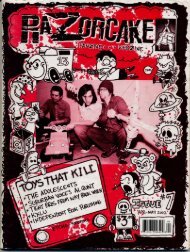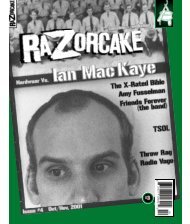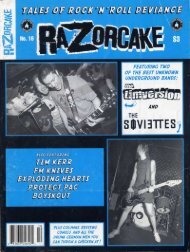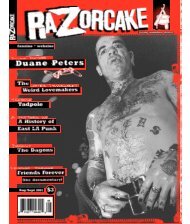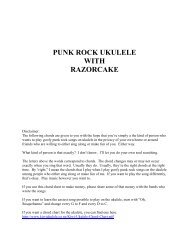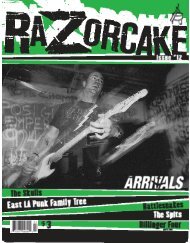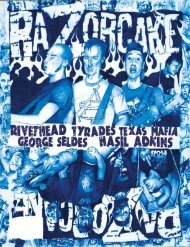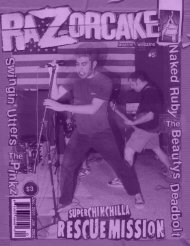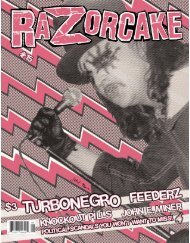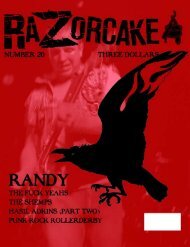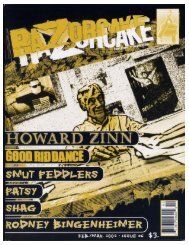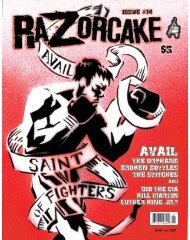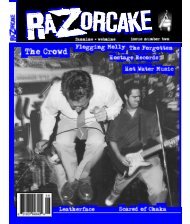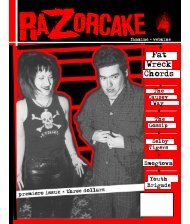You also want an ePaper? Increase the reach of your titles
YUMPU automatically turns print PDFs into web optimized ePapers that Google loves.
SEAN CARSWELL<br />
When we went to the shows in<br />
Brooklyn, the crowd was pretty<br />
well mixed, ethnically speaking,<br />
too. It was Brooklyn, after all. You<br />
get all kinds there. I never gave it a<br />
thought.<br />
Race was a big deal in other<br />
places, though. In the fifties, there<br />
were “white” radio stations and<br />
“black” radio stations in the South.<br />
The “white” radio stations would-<br />
n’t play any of the hits by the<br />
famous black stars like Little<br />
Richard or Fats Domino, even<br />
though those guys were from the<br />
South. Instead, white musicians<br />
like Pat Boone and The Diamonds<br />
would listen to the radio in the<br />
northeast, and, as soon as a song<br />
became a hit, Pat Boone or The<br />
Diamonds or someone like them<br />
would go into the studio and record<br />
the song. So the white stations<br />
wouldn’t play Little Richard’s version<br />
of “Tutti Fruitti,” but Pat<br />
Boone had a big hit with his version<br />
of the same song.<br />
The white versions of the songs<br />
usually weren’t as good. The difference<br />
was really obvious if you listened<br />
to the radio show that came<br />
on after Alan Freed’s, Jocko and<br />
His Rocket Ship. Jocko was a black<br />
DJ, and he played really soulful<br />
music, like Sam Cooke songs and<br />
Ray Charles songs. For a while, he<br />
always played a song called<br />
“Hearts of Stone” by a black group<br />
called The Charms. When you<br />
heard The Charms do “Hearts of<br />
Stone,” it was a really low down<br />
song with a kind of “bop-bopboom”<br />
bass to it. After “Hearts of<br />
Stone” became a hit, a white,<br />
female group called the Fontane<br />
Sisters covered it, and they took the<br />
low down song and sang it like a<br />
bunch of perky cheerleaders. Their<br />
version was really white bread. It<br />
was a different thing altogether.<br />
Anyway, getting back to the<br />
show, Cathy, her cousin, and I got<br />
to see The Penguins, The Nutmegs,<br />
The Flamingos, Lillian Briggs, and<br />
about a half dozen more acts all do<br />
one song each. During the whole<br />
show, the energy in the Paramount<br />
was incredible. Everyone was<br />
screaming and jumping around, but<br />
staying in front of their seats.<br />
Cathy’s uncle kept reading his<br />
Daily News. At the end of the show,<br />
Alan Freed came out and introduced<br />
one of his all-time favorites,<br />
Fats Domino. Fats Domino had<br />
been doing Alan Freed shows since<br />
Alan Freed was still the Moondog,<br />
but Fats Domino was more rock<br />
and roll than R&B. He came out<br />
and belted through two or three of<br />
his hits at the time: “Blueberry<br />
Hill” or “Ain’t That a Shame” or<br />
“I’m in Love Again.” When he was<br />
done, Alan Freed came back out,<br />
thanked everyone for coming, and<br />
that was it. Including the hour and<br />
a half movie before the show, the<br />
whole thing only lasted about three<br />
hours.<br />
The house lights came on.<br />
Cathy’s uncle folded up his newspaper,<br />
stuck it back under his arm,<br />
and stood to leave. The ushers were<br />
quick to clear everyone out. As we<br />
left, we saw another line stretching<br />
down the side of the Paramount and<br />
around the corner. It was full of<br />
teenagers waiting to see the day’s<br />
four o’clock show.<br />
We walked back to the subway,<br />
and Cathy’s uncle and cousin rode<br />
with us all the way to the Jamaica<br />
station. When we got off, we<br />
thanked Cathy’s uncle for taking<br />
us. He said, “You’re welcome.” I<br />
think it was the only thing he’d said<br />
all day.<br />
Over the next few years, I went<br />
to something like twenty to twentyfive<br />
different Alan Freed rock and<br />
roll shows at the Brooklyn<br />
Paramount and the New York<br />
Paramount (after the Brooklyn one<br />
was torn down). I saw a whole<br />
bunch of the big, rock and roll pioneers.<br />
I saw Chuck Berry do his<br />
duck-strut across the stage. He was<br />
amazing, and he was a feature act,<br />
so I got to see a few of his songs. I<br />
saw Screamin’ Jay Hawkins jump<br />
around, waving a shrunken head on<br />
a stick, singing “I Put a Spell on<br />
You.” I saw The Platters sing “Only<br />
You” and “The Great Pretender.” I<br />
saw Little Richard stomp on the<br />
piano and sing, “Good golly, Miss<br />
Molly, she sure like to ball.” I had<br />
no idea what he was talking about<br />
until I was much older, but I sang<br />
along, anyway. (I also found out<br />
much later that the original words<br />
to “Tutti Fruitti” were “Tutti<br />
Fruitti, good booty,” but the studio<br />
made Little Richard change “good<br />
booty” to “aw, rootti” when he was<br />
recording it.)<br />
I saw the Big Bopper before he<br />
got into that plane with Buddy<br />
Holly and Ritchie Valens. I saw<br />
Sam Cooke before he had a onenight<br />
stand with a woman who<br />
robbed him, and he got shot and<br />
killed trying to run her down. I saw<br />
The Shirelles sing, “Will You Still<br />
Love Me Tomorrow?” I saw Dion<br />
and The Belmonts sing “Little<br />
Runaway” and Little Anthony and<br />
the Imperials sing “Tears on My<br />
Pillow.” I saw Frankie Lymon and<br />
The Teenagers before Frankie<br />
Lymon’s voice changed and he<br />
could no longer hit the high notes<br />
that made him famous. To tell the<br />
truth, I can’t remember who else I<br />
saw play, but the shows were<br />
always different and they were<br />
always fun.<br />
After high school, I moved to<br />
upstate New York to go to college.<br />
During my first year there, a few of<br />
the major record companies insisted<br />
that songs by independent<br />
record companies were becoming<br />
hits only because the independent<br />
companies were paying DJs to play<br />
their songs. It was called “payola.”<br />
The majors urged Congress to<br />
investigate the practice of payola.<br />
Congress focused their investigation<br />
on two famous DJs: Dick<br />
Clark and Alan Freed. This was in<br />
1960. I don’t know if either of them<br />
had done anything, but WINS fired<br />
Alan Freed when the investigation<br />
started. It pretty much killed his<br />
career. He tried to get back on the<br />
He was even the first guy to use the term “rock and roll” to describe music<br />
(before that, “rock and roll” was ghetto slang for sex). But Alan Freed knew<br />
all of this and everyone knew it, so he didn’t have to play it up.<br />
radio a few times, but nothing<br />
worked. He basically drank himself<br />
to death by 1965. Nothing ended up<br />
happening to Dick Clark, though.<br />
He kept doing American<br />
Bandstand.<br />
No one could replace Alan<br />
Freed after that. A few DJs tried to<br />
fill his shoes, but it wasn’t the<br />
same. There was something about<br />
him and his shows. He was so gung<br />
ho, and there was just this sense of<br />
everything being fresh and new.<br />
A bunch of those old performers<br />
are dead now. A lot of them got<br />
famous and suddenly had a lot of<br />
money when they were used to<br />
having nothing, and they killed<br />
themselves with drugs and wild living.<br />
A lot of them had one hit and<br />
went back to being nobody again.<br />
A few of these old acts still perform.<br />
I’ve seen some of their<br />
reunion shows on TV. It’s funny to<br />
see these seventy-year-old guys<br />
singing songs about teenage love,<br />
but I still love those songs. I think<br />
it’s funny, too, that, fifty years ago,<br />
my father told me that rock and roll<br />
would never last, and it’s still<br />
around now.<br />
Music has always been like<br />
that, though. One generation never<br />
seems to understand the music of<br />
the generation that comes after<br />
them. Parents rarely understand<br />
their kids’ music. They never think<br />
it will last, when really, it’s not that<br />
different. It’s just the next step in a<br />
long musical progression.<br />
When I think about this, I<br />
always think about Cathy<br />
Lobasso’s uncle, because he didn’t<br />
care about rock and roll at all. He<br />
just read his paper through the<br />
whole thing, through all my<br />
favorite bands and all the songs that<br />
are the soundtrack to my generation.<br />
It was like he wasn’t even<br />
there. He tuned the whole thing out<br />
because the three of us wanted to<br />
go, and he knew that we could only<br />
go if he took us. He was a good<br />
sport. Without him, I may have<br />
never made it to any of those rock<br />
and roll shows.<br />
–Sean Carswell



